by Eamon Keane
“Before the world’s fossil fuels are finally exhausted, it is likely that their extraction will require an
Gérard Velter, general manager of Veolia Water for Africa, Middle East and India
“When measured in calories, the energy market is twenty times the food market. So if governments would replace only 10% of global energy consumption with first-generation biofuels, they in the same stroke would double agricultural water withdrawals”
Peter Braebeck-Letmathe, Chairman, Nestle Group
“The share of biofuels in total use of coarse grains is projected to increase until 2015, reaching 13%”
UN FAO Agricultural Outlook 2010-2019
“The area currently under cultivation is 1.5 billion hectares, so if all that extra land could be used it would represent an increase of one-third. In fact a lot of it either should be left alone for environmental reasons or would be too expensive to farm.”
The Economist special report on feeding the world
Given the above quotes, it is a wonder that most energy outlooks pay only cursory attention to the interrelationship between water, food, energy and climate. Signs of stress in the water-food-energy complex are visible in the record high food prices, dropping water tables and the need for cooling in power plants is on vivid display in northern Japan. Do you know how/if it will affect your investments? Maplecroft’s water security index shows nearly the entire Middle East and North Africa, the origin of much of the world’s oil, as under extreme risk of water scarcity. There’s a nice graphic in the World Economic Forum’s Global Risks 2011 which highlights some of the water-food-energy interactions in Figure 1. I’ll try to concisely address them in this series.

Energy-Water Nexus
Figure 2 shows the water required to extract and refine energy, while Figure 3 shows the energy required to make different forms of electricity. The water needed in primary extraction of oil, gas and coal is not that significant, however it depends on local availability. For instance in China’s Shaanxi Province, the coal reserves cannot be tapped due to lack of water. The plan is to desalinate sea water and pump it uphill for 600 km: “We need water, and the sea can provide it”.
The oil industry uses some 220 mb/d of water for enhanced oil recovery, for an average of about 3 mb/d water per mb/d oil. This is about 0.3% of global water use (4,500 bn m3/year or 77,500 mb/d). In some cases this will be the reinjection of the water cut, however where steam injection is used, the quality is required to be higher. For fossil fuel extraction, the issue is not the absolute volume of water but the environmental pollution that inadequate environmental care can cause. An estimated 12,000 miles of waterways are adversely affected by abandoned coal mines in the US. Shale gas uses relatively low volumes of water, but a few cowboy fraccers could lead to the contamination of rivers or groundwater and so close regulation is required.
The elephant in the energy-water nexus is biofuels, with irrigated corn requiring up to 100,000 litres per GJ. Converted to oil, this is an impressive waste of 3687 mb/d water per mb/d of oil equivalent, or 4.8% of the world’s water consumption. This is the number one reason why first generation biofuels are doa once governments recognise water constraints.
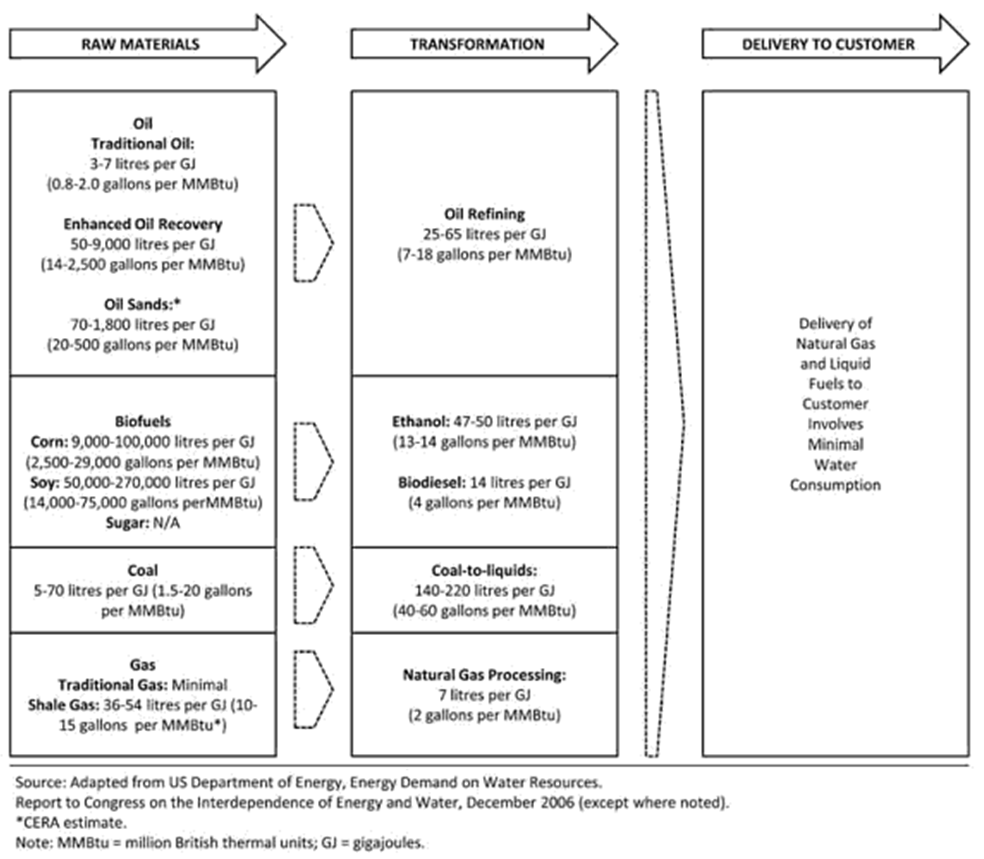
Power generation uses significant quantities of water. Due to the massive volumes of water used in open loop cooling in old designs of nuclear and some fossil fuel power plants, in 2005 41% of American water abstraction (withdrawal from a water
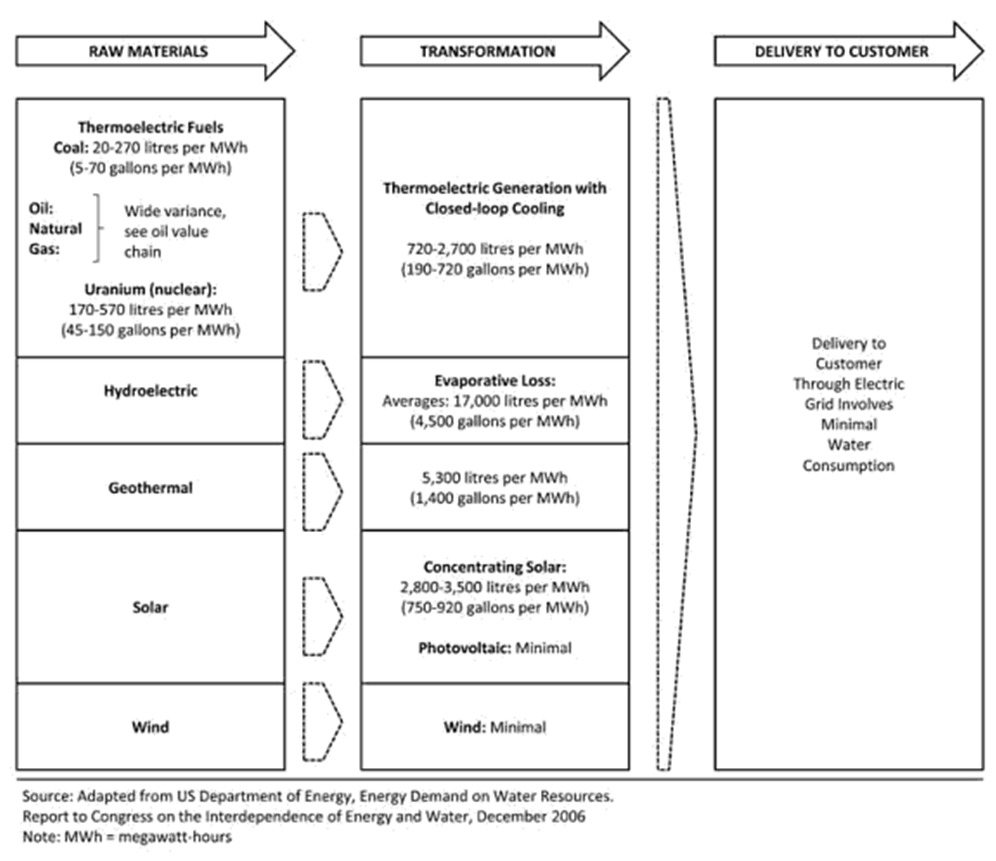
Part 2 will look at the food-water nexus.



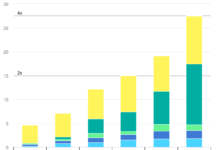
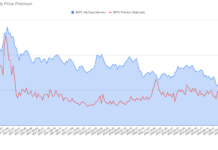

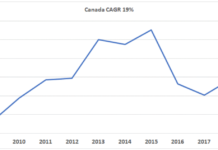
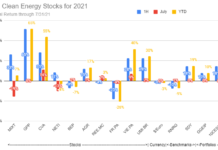
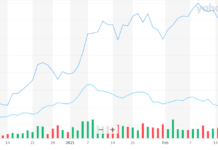
INVITATION: The Circular Economy for a development responsible for the production of food
TITLE OF THE CONFERENCE:
>
GOAL >>> Developing strategies and projects to reduce and reuse waste for sustainable agriculture to zero waste.
“Feeding the planet” means growing food needs in a high population growth rate. This growth of food production is leading also to rapid increase waste generation in agro-food sector that may get to a public health risks, adverse environmental impacts as well as socio-economic problems.
Therefore the reciclyng and reutilization of Agricultural waste becomes an emergent priority for feeding the human life. This become a responsible culture if we will not only decrease natural resource use and implement the environmental degradation, but viceversa we will ensure a sustainable future for coming generations. The conference in Florence would deal about the paradigm shift for linear to cycle -economy, focus on resource recycling and reuse of agricultural waste that must become the primary method of dealing with Agro-food-waste.
The conference is organized by EGOCREANET, in collaboration with Euro Info Centre (member of Enterprise Europe Network) and other subjects that will be progressively involved, will be held on 29 and April 30, 2015
First day : On April 29 a Pre-meeting (- by invitation to organize a consotium for next Calls H-2016-20 on Circular Economy) c /o The Tuscany Region in P. Unita ‘N. 1 in Florence
ON April 30, 2015 Conference (open to public)
c / o AUDITORIUM dell ‘ECRF in via F.Portinari 5r. Firenze.
NB. → The Participation is free .
Scientific Commitee :
Prof. Giampiero Maracchi. President of Accademia dei Georgofili -Firenze
Prof. Paolo Nannipieri : Director of Agro-Food & Environment -University of Florence ,
Dr. Marco Masi :Coordinator ofArea University and Research -Tuscany Region,
→ More information and requests and collaboration proposals can be sent to:
– Paolo Manzelli EGOCREANET
– Marcello Traversi EUROSPORTELLO
Motivation
–> “Circular Economy” , means a system efficiency of the use of resources, in which the end products of a phase of production become the origin of a subsequent phase of co- and by-products, resulting in a diagram, precisely , cyclic. The model can be advantageously applied in the complex processes of agricultural and food products, using waste of agro-food processes for increased productivity by creating nutraceutical products and to obtain and less environmental impact, minimizing any form of waste that pollute the main natural resources (water, air and fertility of the land).
–> EGOCREANET, as organizer and promoter of this event, aims to encourage companies in the food and agriculture sector to innovate by applying the criteria and perspectives of creativity in circular economy, through the creation of working groups, aimed at sharing the issues of greatest interest to develop European and International projects, looking at the financial opportunities of the calls on- Horizon Framework -2016-2020.
The main objective of the Conference in Florence will be to create a “think tank” to aggregate skills and creative abilities of companies and research for sustainable development of the Regional territories in Europe, towards a culture of saving, reusing and recycling within the agro- food area. The event aims to contribute to rethink the sustainability of production chains through developing an integrity between agro-food and nutraceutical production, so as to achieve an innovative thinking design based on self-sustainable energy and zero-waste recycling.
The two day’s program will include: technical-scientific interventions of University and CNR and ENEA and innovative agri-food companies, a panel discussion and testimonies about European best practices, to analyze and discuss models, technologies and solutions to “change direction” in the traditional linear logic of developmental sustenability ‘in economics and society:
The goals of that meetings in summary are:
– Reduce agricultural waste
– Enhancing waste and transformation in resources
Interlinking resources – Optimize water management and Reduce energy consumption
– Producing alternative energy from renewable sources
– Favoring integrity between food and nutraceutical & functional-food co-production
egocreanet2012@gmail.com
INVITATION: The Circular Economy for a development responsible for the production of food
TITLE OF THE CONFERENCE:
>
GOAL >>> Developing strategies and projects to reduce and reuse waste for sustainable agriculture to zero waste.
“Feeding the planet” means growing food needs in a high population growth rate. This growth of food production is leading also to rapid increase waste generation in agro-food sector that may get to a public health risks, adverse environmental impacts as well as socio-economic problems.
Therefore the reciclyng and reutilization of Agricultural waste becomes an emergent priority for feeding the human life. This become a responsible culture if we will not only decrease natural resource use and implement the environmental degradation, but viceversa we will ensure a sustainable future for coming generations. The conference in Florence would deal about the paradigm shift for linear to cycle -economy, focus on resource recycling and reuse of agricultural waste that must become the primary method of dealing with Agro-food-waste.
The conference is organized by EGOCREANET, in collaboration with Euro Info Centre (member of Enterprise Europe Network) and other subjects that will be progressively involved, will be held on 29 and April 30, 2015
First day : On April 29 a Pre-meeting (- by invitation to organize a consotium for next Calls H-2016-20 on Circular Economy) c /o The Tuscany Region in P. Unita ‘N. 1 in Florence
ON April 30, 2015 Conference (open to public)
c / o AUDITORIUM dell ‘ECRF in via F.Portinari 5r. Firenze.
NB. → The Participation is free .
Scientific Commitee :
Prof. Giampiero Maracchi. President of Accademia dei Georgofili -Firenze
Prof. Paolo Nannipieri : Director of Agro-Food & Environment -University of Florence ,
Dr. Marco Masi :Coordinator ofArea University and Research -Tuscany Region,
→ More information and requests and collaboration proposals can be sent to:
– Paolo Manzelli EGOCREANET
– Marcello Traversi EUROSPORTELLO
Motivation
–> “Circular Economy” , means a system efficiency of the use of resources, in which the end products of a phase of production become the origin of a subsequent phase of co- and by-products, resulting in a diagram, precisely , cyclic. The model can be advantageously applied in the complex processes of agricultural and food products, using waste of agro-food processes for increased productivity by creating nutraceutical products and to obtain and less environmental impact, minimizing any form of waste that pollute the main natural resources (water, air and fertility of the land).
–> EGOCREANET, as organizer and promoter of this event, aims to encourage companies in the food and agriculture sector to innovate by applying the criteria and perspectives of creativity in circular economy, through the creation of working groups, aimed at sharing the issues of greatest interest to develop European and International projects, looking at the financial opportunities of the calls on- Horizon Framework -2016-2020.
The main objective of the Conference in Florence will be to create a “think tank” to aggregate skills and creative abilities of companies and research for sustainable development of the Regional territories in Europe, towards a culture of saving, reusing and recycling within the agro- food area. The event aims to contribute to rethink the sustainability of production chains through developing an integrity between agro-food and nutraceutical production, so as to achieve an innovative thinking design based on self-sustainable energy and zero-waste recycling.
The two day’s program will include: technical-scientific interventions of University and CNR and ENEA and innovative agri-food companies, a panel discussion and testimonies about European best practices, to analyze and discuss models, technologies and solutions to “change direction” in the traditional linear logic of developmental sustenability ‘in economics and society:
The goals of that meetings in summary are:
– Reduce agricultural waste
– Enhancing waste and transformation in resources
Interlinking resources – Optimize water management and Reduce energy consumption
– Producing alternative energy from renewable sources
– Favoring integrity between food and nutraceutical & functional-food co-production
egocreanet2012@gmail.com